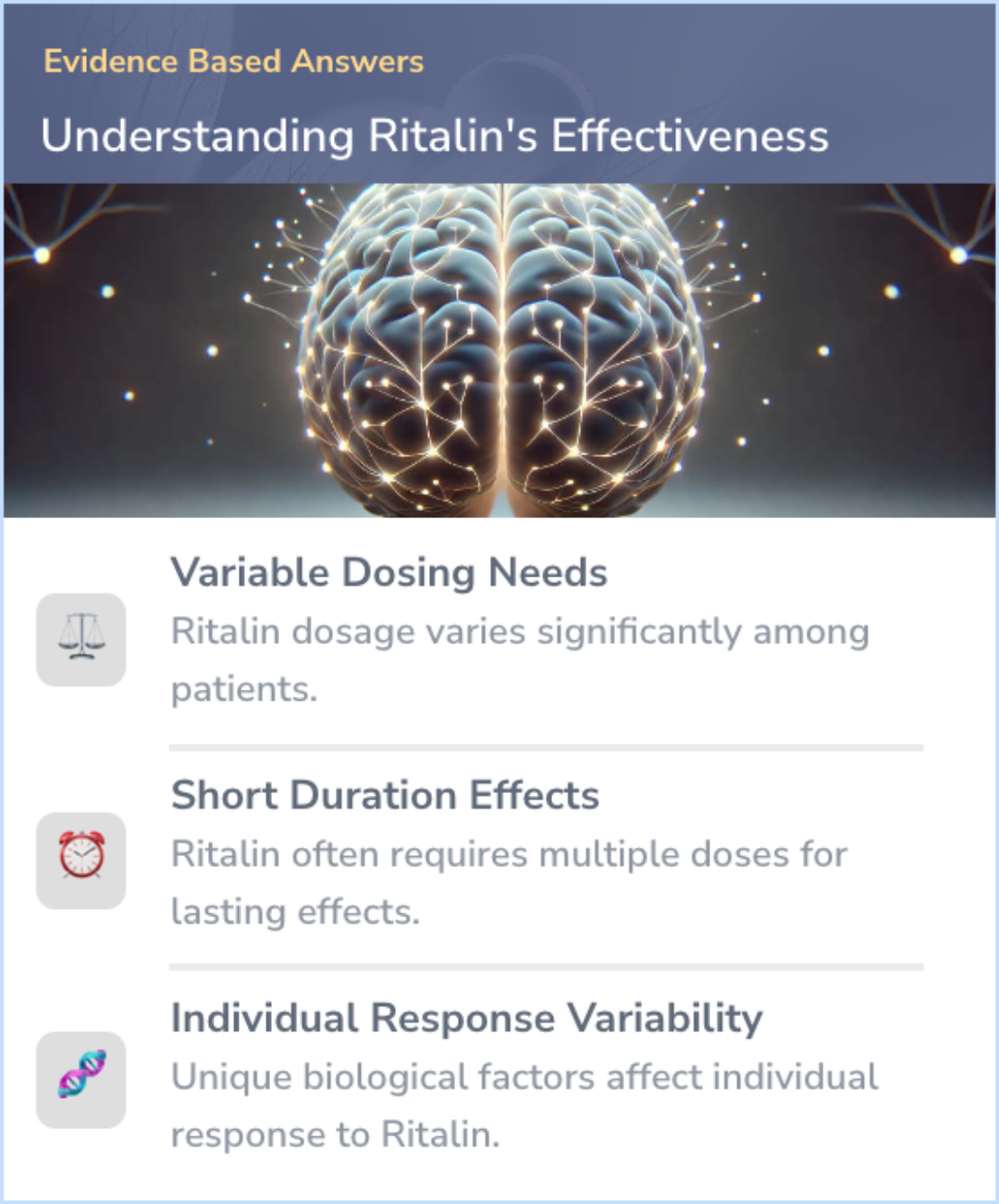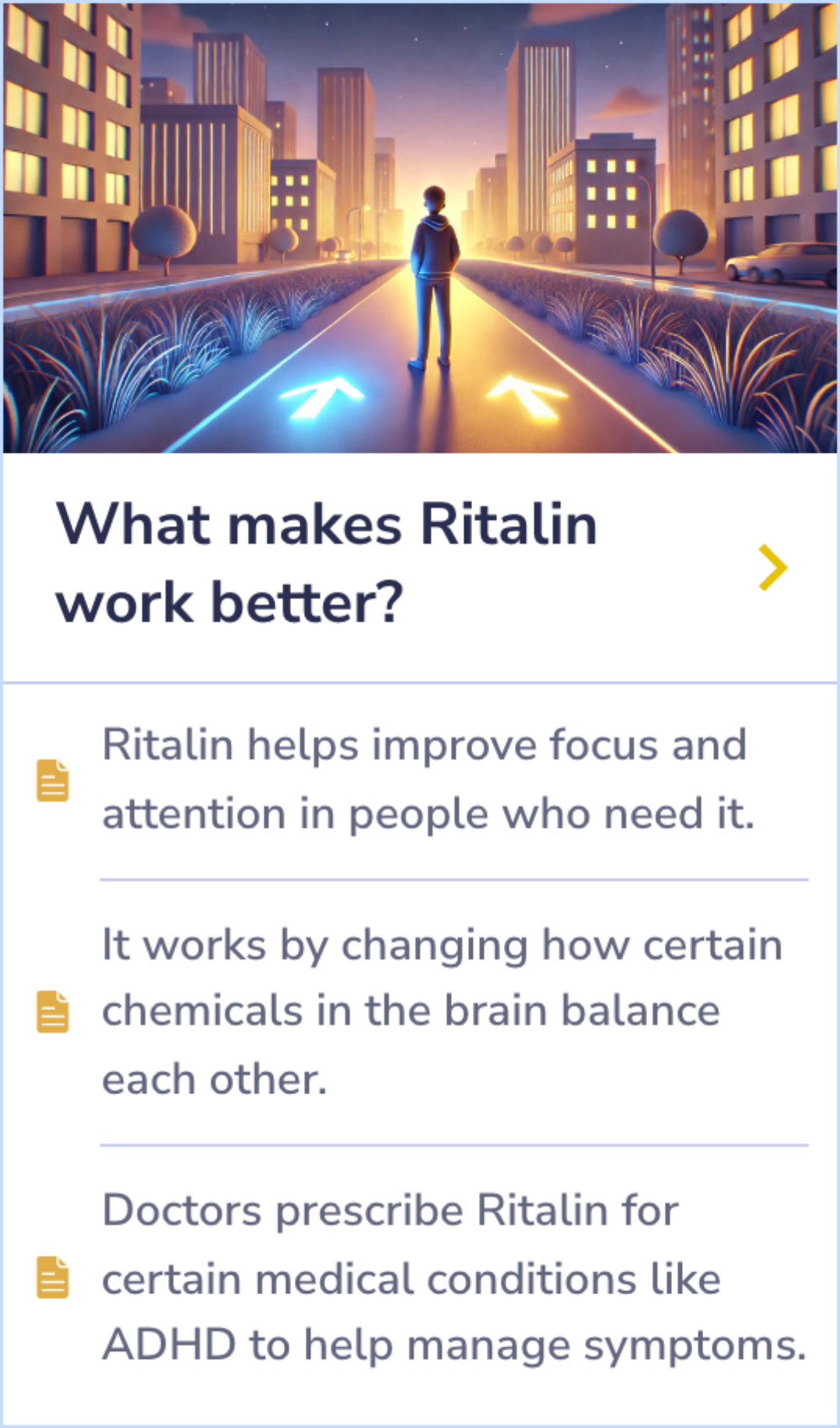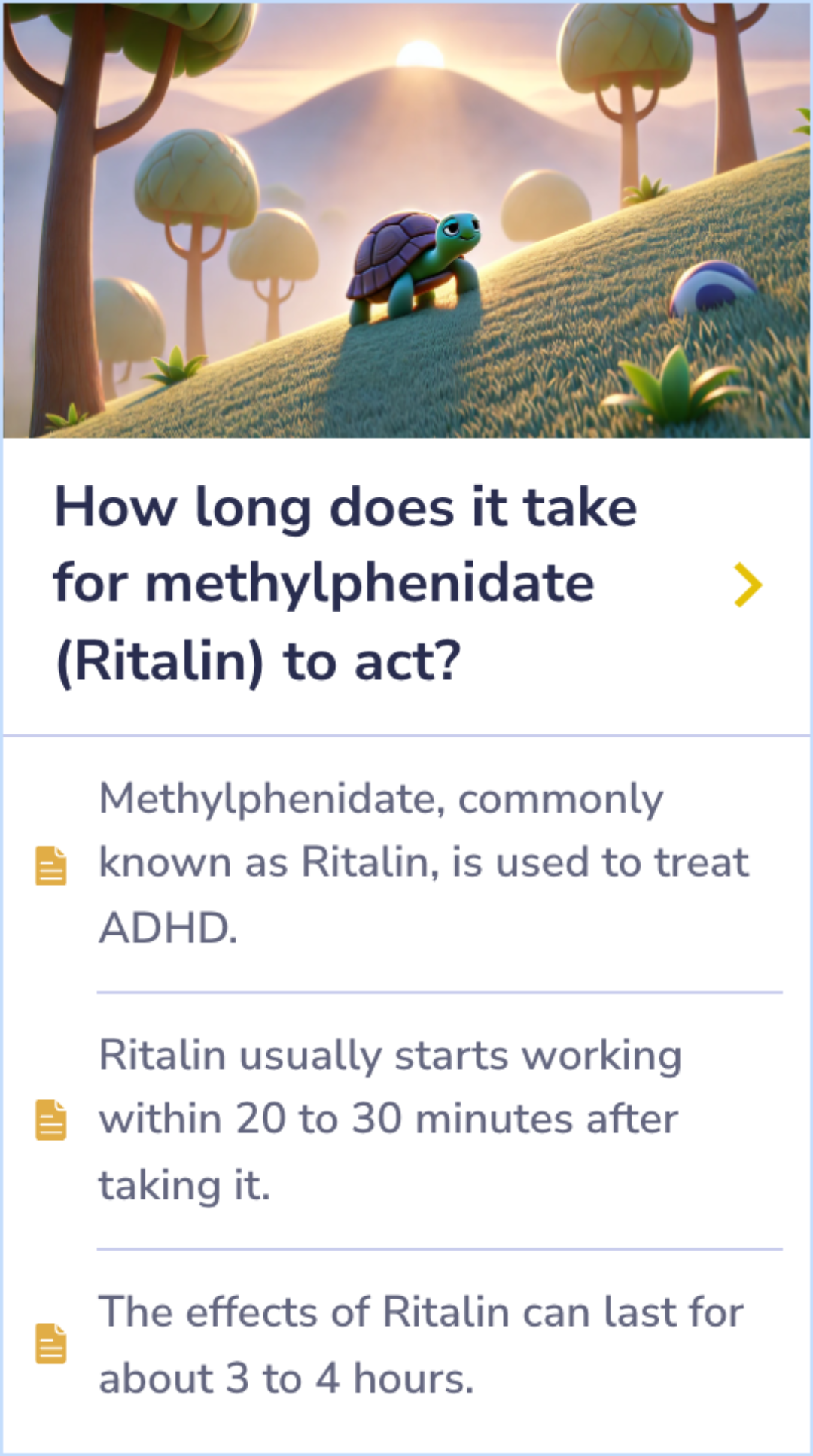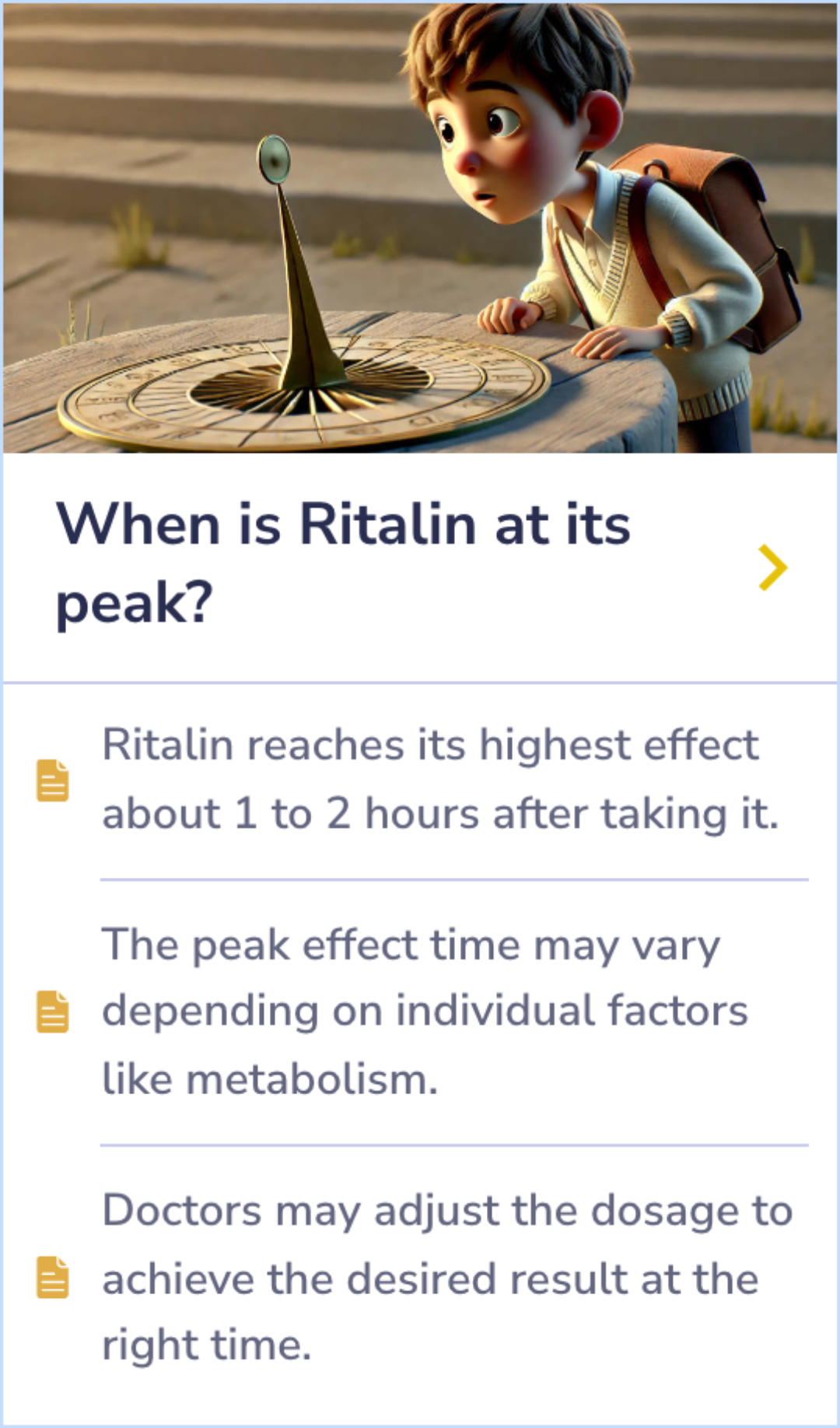Ritalin
Evidence Based Answers
Why does it feel like my Ritalin is not working?
Taking Ritalin without ADHD could lead to unpredictable effects. Differences in individual biology and potential for tolerance contribute to varied effectiveness.
Published: November 2, 2024
Click to explore a section:

Ritalin effectiveness can be unpredictable due to varied dosing needs, short effect duration, and individual biological differences.
Background: Adult Instructions
Ritalin is typically prescribed 2-3 times per day, often taken 30-45 minutes before meals to maximize its effectiveness. The immediate-release form has a short action duration of 1-4 hours, requiring multiple doses throughout the day to maintain effects.
Some individuals may require higher doses or more frequent administration due to differences in metabolism and response, highlighting why it might feel like the medication's effects are inconsistent or wear off quickly.
Some individuals may require higher doses or more frequent administration due to differences in metabolism and response, highlighting why it might feel like the medication's effects are inconsistent or wear off quickly.
Personal Experiences
Perspectives: Why Ritalin May Not Feel Effective
In discussions on why Ritalin might not feel effective, people point out various potential causes and solutions.
Some mention adjusting dosages, considering other medications, or lifestyle factors. Others raise the idea of natural tolerance or different responses to medication, while a few reflect on their personal challenges with Ritalin not providing expected effects.
Some mention adjusting dosages, considering other medications, or lifestyle factors. Others raise the idea of natural tolerance or different responses to medication, while a few reflect on their personal challenges with Ritalin not providing expected effects.
Reddit: u/sturmeh
May require an increased dosage, or you might be in the 30% category that doesn't respond to Methylphenidate. Talk to your care provider about what you've observed, and they'll likely suggest increasing the dose or trying Dextroamphetamine instead...Is Your Ritalin Dose Right for You?
Ritalin’s effectiveness can vary widely depending on the dose.
Some people may respond well to lower doses, while others might need higher doses for optimal effects.
Even individuals of similar size may need different dosages, as body size alone doesn’t account for these differences.
Some people may respond well to lower doses, while others might need higher doses for optimal effects.
Even individuals of similar size may need different dosages, as body size alone doesn’t account for these differences.
“
Source Quotes:
Optimal methylphenidate doses for the treatment of children with ADHD range from 5 mg to 20 mg per administration (a fourfold difference). Some small children require high doses and some large children require small doses, so adjustment for weight does not account for this range.
While many common side effects can be relieved by adjusting the dosage or avoiding an afternoon or evening dose, some require treatment emergently to prevent complications.
How Long Does Ritalin Work?
Ritalin’s effects are often short-lasting, leading to a need for multiple doses each day.
Immediate-release Ritalin reaches its peak effect within 1-2 hours, and its effects may diminish after about 4 hours.
For longer relief, extended-release forms are available, though they may not work equally well for everyone.
Immediate-release Ritalin reaches its peak effect within 1-2 hours, and its effects may diminish after about 4 hours.
For longer relief, extended-release forms are available, though they may not work equally well for everyone.
“
Source Quotes:
Methylphenidate is a short-acting stimulant with a 1- to 4-hour duration of action and t1/2 2 to 3 hours. The tmax following oral administration occurs at about 2 hours.
Since the half-life of methylphenidate is short, the drug has been made available as a sustained-release formulation in addition to the traditional immediate-release formulation.
Why Ritalin Works Differently for Everyone
Responses to Ritalin can vary greatly among individuals due to unique biological factors.
Variations in dopamine transporter activity or drug metabolism can influence how effective Ritalin is.
These factors mean that a dose that works for one person might not be as effective for another, making dose adjustments necessary.
Variations in dopamine transporter activity or drug metabolism can influence how effective Ritalin is.
These factors mean that a dose that works for one person might not be as effective for another, making dose adjustments necessary.
“
Source Quotes:
Clinical and imaging studies have documented large individual differences in response to stimulant drugs with respect to their therapeutic as well as their reinforcing effects.
Not all subjects with ADHD improve on methylphenidate. There are groups of 'non-responders' who do not exhibit significant behavioural improvement on the drug.
Is Your Body Getting Used to Ritalin?
Tolerance to Ritalin can develop for some people, meaning the same dose may seem less effective over time.
In cases of tolerance, adjusting the dose or switching medications may help regain the desired effects.
People might notice a reduction in effectiveness, especially with long-term use.
In cases of tolerance, adjusting the dose or switching medications may help regain the desired effects.
People might notice a reduction in effectiveness, especially with long-term use.
“
Source Quotes:
Chronic abusive use can lead to marked tolerance and psychological dependence with varying degrees of abnormal behavior.
The therapeutic dosages for ADHD or narcolepsy that physicians prescribe are not harmful enough to activate the reward system within the CNS.
Key Takeaways
Conclusions
Dosing plays a key role in Ritalin's effectiveness, and finding the right amount requires careful adjustments. Some individuals may metabolize the medication quickly, leading to shorter periods of effect and the perception that Ritalin isn't working.
Biological differences, such as variations in dopamine transporter activity, and the potential development of tolerance further contribute to variances in response.
Biological differences, such as variations in dopamine transporter activity, and the potential development of tolerance further contribute to variances in response.

Evidence Summary
How Ritalin Enhances Focus and Attention
Ritalin boosts focus and attention by adjusting brain chemicals to help manage ADHD symptoms. It enables people who need it to concentrate more effectively, addressing specific challenges in daily activities.
The medication works by balancing certain brain chemicals that affect alertness and impulse control. This targeted action makes it a common choice for those struggling with ADHD.
Doctors often prescribe Ritalin to improve attention and reduce distractibility in patients needing support for their condition.
The medication works by balancing certain brain chemicals that affect alertness and impulse control. This targeted action makes it a common choice for those struggling with ADHD.
Doctors often prescribe Ritalin to improve attention and reduce distractibility in patients needing support for their condition.
Evidence Summary
Quick-Acting Relief: How Ritalin Fits Into Daily Life
Ritalin, a common ADHD medication, starts working quickly, usually within 20 to 30 minutes. Its effects provide a short window, lasting about 3 to 4 hours, allowing for targeted symptom relief during crucial parts of the day.
Planning doses around this timing helps manage daily routines and achieve a smoother schedule for activities that require focus and attention.
Planning doses around this timing helps manage daily routines and achieve a smoother schedule for activities that require focus and attention.
Evidence Summary
Timing Ritalin’s Peak Effect for Best Results
Ritalin generally reaches its peak effect between 1 to 2 hours after taking it, though this timing can vary based on personal factors, such as metabolism.
Doctors may fine-tune doses to help individuals experience Ritalin’s effects at the most beneficial time for their needs, adjusting as necessary to find the right balance for each person.
Doctors may fine-tune doses to help individuals experience Ritalin’s effects at the most beneficial time for their needs, adjusting as necessary to find the right balance for each person.


